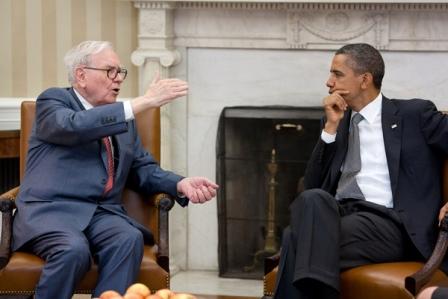April 25, 2012, - 3:11 pm
HYPOCRITE: Warren Buffett Spent $1 Milln to Lobby for Less Taxes
Apparently, billionaire Warren Buffett’s motto should be, “Do as I say, not as I do.” As you know, for the last several years Buffett has been whining that his secretary pays a higher tax rate than he does, and he’s been calling for more taxes on the rich. But it turns out that, privately, Buffett has been seeking less taxes for the rich . . . especially the rich who have private planes. And he got government fees reduced, saving the jet-set rich $83 million in government assessments. The victory reduced the amount of FAA funding borne by fat cats with private planes and increased the proportion paid by average travelers in the cattle sections of American commercial airliners.

“My Taxes Aren’t High Enough! Hey, My Private Jet Taxes Are Way Too High!”
NetJets Inc., the private-jet company owned by Mr. Buffett’s Berkshire Hathaway Inc., spent more than $1 million over the past three years to lobby Congress to cut a user fee, benefiting the company’s well-heeled customers, who buy or lease shares in planes. The reduced fee, part of the recent Federal Aviation Administration bill that took effect earlier this month, will save customers of NetJets and other similar companies roughly $83 million over about four years, according to congressional estimates.
The lobbying victory comes as Mr. Obama and congressional Democrats are using Mr. Buffett’s comments to criticize the likely Republican presidential nominee, Mitt Romney, who paid a relatively low federal tax rate of 13.9% for 2010. Last year, Mr. Buffett called it unfair that wealthy investors often face lower effective tax rates than their secretaries, largely because capital gains are taxed at lower rates than salaried income. . . .
Mr. Obama and Democrats in Congress have proposed a so-called Buffett Rule, which would require individuals earning more than $1 million a year to pay a tax rate of at least 30%. Last week, the Senate voted mostly along party lines to reject the plan.
The Buffett Rule has become a flashpoint in the broader debate over tax policy and an important election-year symbol in a race that features Mr. Romney, a former private-equity executive.
Just remember that the “Buffett Rule” has a secret corollary.
At issue is the government’s system to determine who pays fees that fund the FAA and the nation’s air-traffic control system. Commercial airlines, which shoulder the largest share, pay mostly through a 7.5% tax levied directly on customers when they buy tickets. Noncommercial fliers pay via a surtax based on fuel consumption.
NetJets and other similar companies had previously been considered commercial airlines for the purposes of the fees.
In recent years, some in Congress have sought to raise fees across the board to cover a greater share of the cost of a modernized air-traffic control system. The FAA estimates the new system could cost between $29 billion and $42 billion through 2025.
Under the bill in question, a routine piece of legislation that reauthorized the FAA, commercial airlines didn’t see any decrease in fees. NetJets, by contrast, won its bid to change its classification to a noncommercial airline and will end up paying less during the life of the provision, which expires in 2015.
NetJets said its goal was to rationalize how the industry is treated. Previously, the FAA and Internal Revenue Service had disagreed about whether such aviation should be considered commercial or noncommercial. NetJets is suing the IRS over fees its customers previously paid under the “commercial” classification.
The lobbying campaign on Capitol Hill was “intended to get a clarification so that the tax code is congruent,” said Bob Tanner, the company’s vice president for government affairs. “This was not to get a tax cut,” he said.
Huh? That’s exactly what it was–a tax cut for the rich at the same time as a tax increase for the poor, the very thing Warren Buffett keeps pretending he’s against.
The change effectively lowers the fees NetJets customers have to pay.
The Joint Committee on Taxation, Congress’s official tax accounting wing, estimated the change would save owners of fractional airplanes a total of $83 million before expiring in late 2015. NetJets controls about 68% of the so-called fractional-jet business, the company said.
Critics of the provision say that the NetJets lobbying effort is another example of the problems with the way Washington works.
“There has been so much rhetoric about the tax code, yet NetJets can get a tax break in this bill,” said Steve Ellis, vice president of Taxpayers for Common Sense, a nonpartisan organization that criticizes what it considers excessive government spending.
So, what was that Warren Buffett was saying about how upset he is that the less fortunate–like his well-paid secretary–have to pay more in taxes than he does? Funny, how he doesn’t have the same attitude about how much average airline passengers have to pay versus what he and the private jet owners pay.
Don’t look for President Obama or anyone else to ever feature an average airline passenger in the House Gallery during the State of the Union address, though. We need to keep the space free to help Warren Buffett and other left-wing hypocrites whine about the capital gains tax.
Tags: FAA, FAA funding, NetJets, NetJets Inc, tax breaks, Warren Buffett


Buffett is more than a bit of a horse’s ass. His tax hikes will hurt upper middle class professionals more tha people like him. He advocates for tax hikes while his company (in which his own net worth is tied up) is avoiding about 1 BILLION dollars in taxes.
I dislike the man intensely.
Occam's Tool on April 25, 2012 at 3:44 pm